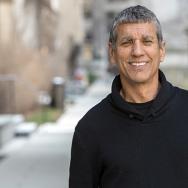Two members of the University of Chicago faculty have been elected as fellows of the American Association for the Advancement of Science, a distinguished lifetime honor within the scientific community.
Profs. Guangbin Dong and Benoît Roux have made breakthroughs in organic synthetic chemistry and biophysics. They join the 2023 class, announced April 18, which includes scientists, engineers and innovators across multiple fields.
Guangbin Dong is the Weldon G. Brown Professor of Chemistry.
Dong’s expertise is in the field of organic synthesis, catalysis, organometallics and organic materials. His lab works to harness transition-metal catalysts and boron chemistry to address challenges in the arena of chemoselectivity and multi-step synthesis.
He specializes in efficient ways to introduce functional groups into organic molecules; innovative approaches to activate and functionalize inert chemical bonds; efficient ways to synthesize molecules with complex skeletons; and strategies to quickly access structurally complex but important biologically active molecules.
His previous awards include the Arthur C. Cope Scholar Award, the American Chemical Society’s Elias J. Corey Award, a Sloan Research Fellowship, an American Cancer Society Research Scholarship, and a National Sciences Foundation CAREER Award, among others.
He joined the University of Chicago in 2016.
Benoît Roux is the Amgen Professor of Biochemistry and Molecular Biology.
Roux is a biophysicist who uses theoretical and computational methods to advance the understanding of the structure, dynamics and function of biological systems at the atomic level.
Using a computational approach called “molecular dynamics,” Roux’s lab constructs detailed atomic models of the macromolecular system and, having described the microscopic forces with a potential function, simulates the dynamical motions of all the atoms as a function of time. The calculated trajectory, though an approximation to the real world, provides detailed information about the time course of the atomic motions, which is nearly impossible to access experimentally.
He is being recognized by the AAAS for “distinguished contributions to the field of biophysics, with ground-breaking theoretical and computational work that have served to establish the physical principles governing the function of biological macromolecules.”
He joined the University of Chicago in 2006.
